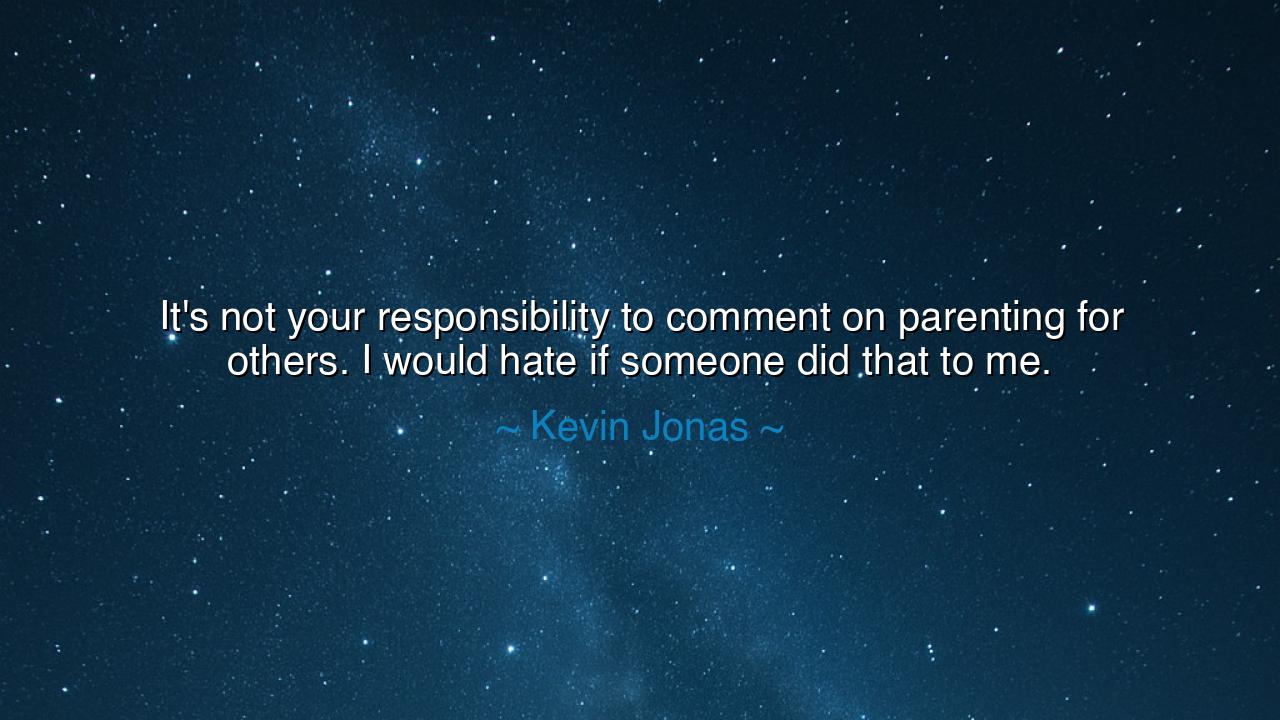
It's not your responsibility to comment on parenting for others.
It's not your responsibility to comment on parenting for others. I would hate if someone did that to me.






Hearken, O children of generations yet to come, and attend to the solemn wisdom of Kevin Jonas, who speaks with the voice of respect and humility: “It's not your responsibility to comment on parenting for others. I would hate if someone did that to me.” In these words lies a profound recognition as old as the counsel of elders: that the act of raising children is sacred and personal, and that judgment from outsiders often burdens the heart without guiding it. Parenting is a path walked in love, responsibility, and vigilance, and it is shielded from the idle critique of those unversed in its trials.
The origin of this reflection rests in Jonas’ life as a father and observer of human relationships, where he witnessed both the joys and struggles of raising children and the intrusion of judgment from others. He acknowledges that the labor of nurture is intimate, demanding, and laden with choices unique to each household. From this experience springs the ancient truth that wisdom in parenting is cultivated through presence and reflection, not through commentary or comparison, and that respect for the autonomy of other families is a mark of moral understanding.
The meaning of his words is both practical and moral. To refrain from commenting on another’s parenting is to honor the sovereignty of their household, the dignity of the parent, and the individuality of the child. Critique may wound or unsettle, whereas support, understanding, and empathy cultivate strength, trust, and wisdom. Jonas teaches that the duty of the observer is not to judge, but to offer compassion and discretion, recognizing that each parent navigates trials unseen by others.
Consider the life of Mahatma Gandhi, who guided his family with steadfast principle, yet remained subject to critique and misunderstanding from neighbors and society. Though others sought to instruct or judge, Gandhi understood that the moral labor of parenting and guidance is borne by the parent alone, and that external judgment, however well-intentioned, often diminishes rather than strengthens the bond between parent and child. Jonas’ insight echoes this eternal lesson: respect, restraint, and humility are the virtues of those who witness, but do not intrude.
Jonas’ reflection also carries a subtle warning: the compulsion to judge or advise can erode both the dignity of the parent and the confidence of the child. Even well-meaning critique may sow doubt, tension, or resentment. To abstain from commentary is to uphold trust, respect, and emotional safety within the family, allowing the parent to act according to conscience and the unique needs of their children. It is a practice of ethical restraint and moral awareness, ancient in its wisdom.
The lesson for future generations is radiant: honor the sanctity and individuality of parenting. Refrain from judgment, embrace empathy, and offer support only when asked or appropriate. Recognize that every household is a microcosm of values, choices, and challenges, and that the child’s growth and the parent’s decisions are matters of profound intimacy. Respect for this process nurtures harmony, understanding, and mutual trust.
In practical life, one may follow Jonas’ counsel by cultivating restraint, observation, and compassion. Speak only with consent, offer guidance when requested, and avoid comparison or unsolicited critique. Support parents through encouragement, practical aid, or listening, rather than through judgment. By this practice, one honors both the labor of parenting and the dignity of those entrusted with the care of children.
Thus, O children of future ages, carry this teaching as both shield and lamp: it is not your responsibility to comment on the parenting of others. Honor their labor, respect their choices, and withhold judgment. In doing so, you preserve trust, dignity, and harmony, allowing the sacred work of raising the young to unfold in wisdom, courage, and love—a legacy that endures across generations.






AAdministratorAdministrator
Welcome, honored guests. Please leave a comment, we will respond soon